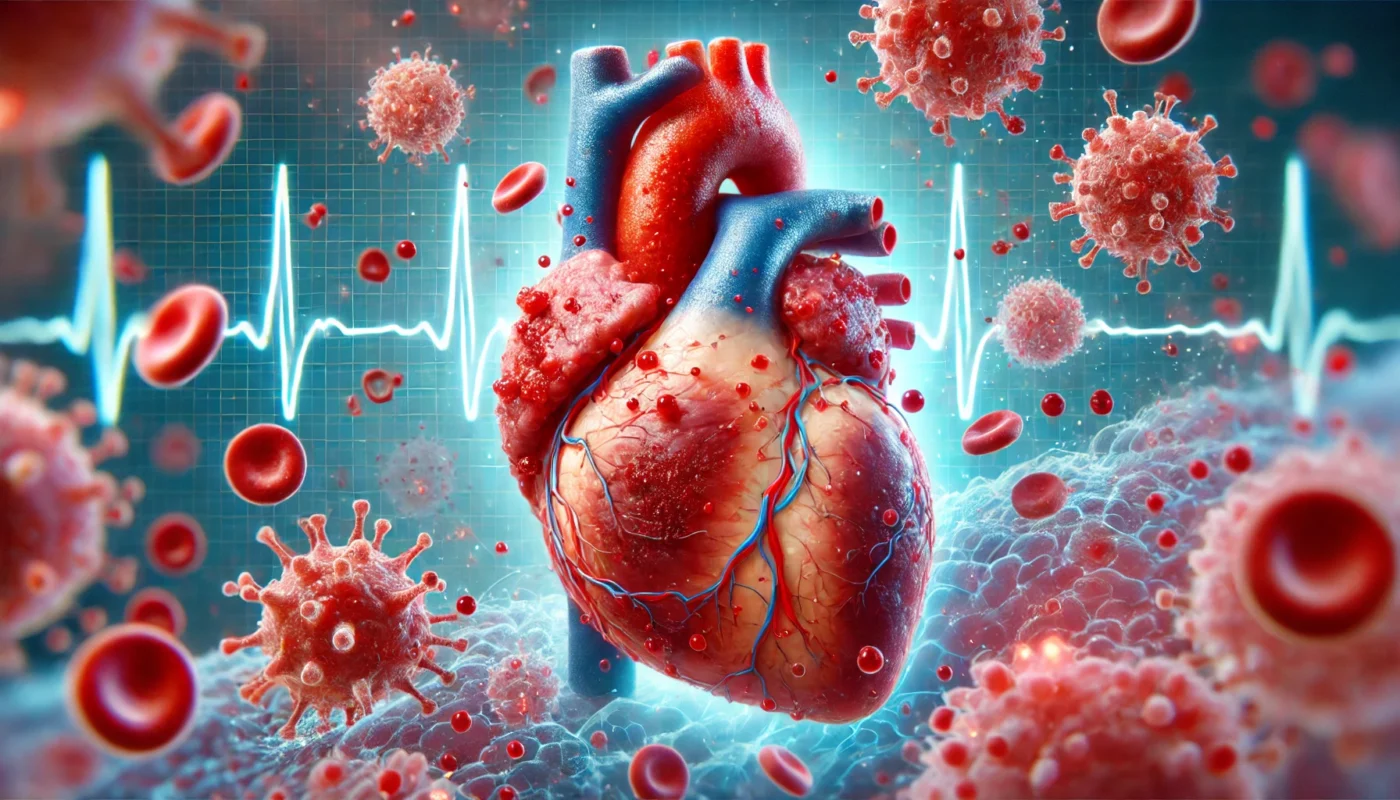Heart inflammation, medically known as myocarditis, refers to the inflammation of the heart muscle. This condition can be triggered by various factors, including viral infections, autoimmune diseases, and exposure to certain drugs or toxins. The inflammation can impact the heart’s ability to pump blood effectively, leading to a range of symptoms and potential complications.
You may also like: 20 Powerful Anti-Inflammatory Foods
The Mechanism of Inflammation
The process of inflammation involves the body’s immune response to perceived threats. When the heart muscle becomes inflamed, it can result in swelling, damage to heart cells, and impaired heart function. This response is intended to protect the body but can sometimes cause harm if not controlled.
Common Triggers of Heart Inflammation
Several factors can initiate heart inflammation. Viral infections are among the most common culprits, with viruses such as the influenza virus and COVID-19 being notable examples. Autoimmune diseases, where the immune system mistakenly attacks healthy tissues, can also lead to inflammation. Additionally, certain medications and environmental toxins have been identified as triggers.
Impact on Heart Function
The inflammation of the heart muscle can significantly affect its ability to function. The heart’s efficiency in pumping blood can be compromised, leading to symptoms such as fatigue and shortness of breath. If the condition persists, it may cause long-term damage to the heart structure and function.
Types of Heart Inflammation
There are several types of heart inflammation, each with unique characteristics:
Myocarditis
This involves the inflammation of the heart muscle itself. It can cause symptoms such as chest pain, fatigue, and shortness of breath. The causes of myocarditis are diverse, ranging from viral infections to autoimmune responses. Early detection and treatment are crucial to prevent complications.
Pericarditis
This occurs when the lining surrounding the heart, known as the pericardium, becomes inflamed. Symptoms often include sharp chest pain, which may worsen with certain movements or breathing. Pericarditis can result from infections, injuries, or systemic inflammatory conditions.
Endocarditis
This is the inflammation of the inner lining of the heart chambers and valves. It is typically caused by a bacterial infection and can lead to severe complications if not treated promptly. Individuals with existing heart conditions or artificial heart valves are at higher risk for endocarditis.
Other Forms of Heart Inflammation
While myocarditis, pericarditis, and endocarditis are the most recognized forms, inflammation can also affect other parts of the heart. These include conditions like pancarditis, where all layers of the heart are inflamed, though such cases are rare.
What Does Myocarditis Feel Like?
The symptoms of myocarditis can vary widely, ranging from mild to severe. Common symptoms include:
Identifying Symptoms
Symptoms such as chest pain or discomfort, fatigue, and shortness of breath, especially during exertion, are common indicators of myocarditis. It’s important to note that these symptoms can mimic other conditions, making diagnosis challenging.
Recognizing Arrhythmias
Myocarditis can lead to abnormal heart rhythms (arrhythmias), which may manifest as palpitations or a racing heart. Arrhythmias can be dangerous and require medical intervention to manage effectively.
Additional Signs to Watch
Other symptoms might include swelling in the legs, ankles, or feet, which can indicate fluid retention due to heart dysfunction. Recognizing these signs early can prompt timely medical consultation and treatment.

Causes and Risk Factors
Understanding the underlying causes of heart inflammation is vital for prevention and management. Some common causes include:
Viral Infections
Viruses, such as the influenza virus, Coxsackie virus, and COVID-19, are known to cause myocarditis. These infections can directly invade the heart tissue, triggering an inflammatory response. Vaccination and hygiene practices are essential preventive measures.
Autoimmune Diseases
Conditions such as lupus and rheumatoid arthritis can lead to inflammation of the heart as the body’s immune system mistakenly attacks healthy heart tissue. Management of these underlying conditions is crucial to prevent cardiac involvement.
Medications and Toxins
Certain drugs and environmental toxins can induce heart inflammation as a side effect. It’s essential to discuss any medications you are taking with your healthcare provider to understand potential risks. Awareness of environmental hazards can also aid in prevention.
Bacterial Infections
Bacterial infections, such as streptococcal infections, can lead to endocarditis, a severe form of heart inflammation. Prompt treatment of bacterial infections with appropriate antibiotics is necessary to prevent complications.
Genetic and Lifestyle Factors
Genetic predispositions and lifestyle choices, such as smoking or excessive alcohol consumption, can increase the risk of heart inflammation. Modifying lifestyle factors can significantly reduce the likelihood of developing myocarditis.
Can Heart Inflammation Be Cured?
The prognosis for heart inflammation largely depends on its cause and severity. In many cases, myocarditis resolves on its own with appropriate treatment and lifestyle modifications. However, severe cases may require more aggressive interventions, such as medications to manage symptoms and, in rare instances, surgical procedures.
Treatment Options
Treatment for heart inflammation is tailored to the underlying cause and may include:
Medications
Anti-inflammatory drugs, such as corticosteroids, can help reduce inflammation and alleviate symptoms. In cases of bacterial infection, antibiotics may be necessary. Other medications might be prescribed to manage symptoms like arrhythmias.
Lifestyle Modifications
Adopting a heart-healthy lifestyle is essential for managing heart inflammation. This includes maintaining a balanced diet, engaging in regular physical activity, and avoiding smoking and excessive alcohol consumption. Stress management techniques can also be beneficial.

Monitoring and Follow-Up
Regular check-ups with a healthcare provider are crucial to monitor the condition’s progression and adjust treatment plans as needed. Follow-up appointments allow for the assessment of heart function and the effectiveness of interventions.
Advanced Therapeutic Approaches
In severe cases, advanced treatments such as immunosuppressive therapy or even cardiac surgery might be required. These interventions are considered when standard treatments are insufficient to control the condition.
Potential Complications
While many individuals recover fully from heart inflammation, some may experience complications, particularly if the condition is left untreated. Potential complications include:
Chronic Heart Failure
Prolonged inflammation can weaken the heart muscle, leading to heart failure, a condition where the heart cannot pump blood effectively. Managing heart failure requires a comprehensive approach involving medication, lifestyle changes, and possibly surgical interventions.
Arrhythmias
Inflammation can disrupt the heart’s electrical system, resulting in irregular heartbeats that may require medical intervention. Some arrhythmias may necessitate the use of pacemakers or defibrillators.
Cardiac Arrest
In severe cases, myocarditis can lead to sudden cardiac arrest, a life-threatening condition that requires immediate medical attention. Awareness and preparedness for such emergencies can save lives.
Long-Term Health Implications
Chronic inflammation may contribute to other cardiovascular diseases over time. Monitoring and managing risk factors are vital for long-term heart health.
Does Myocarditis Go Away?
The duration of myocarditis varies depending on the individual and the underlying cause. In many cases, symptoms improve with appropriate treatment, and individuals can return to their regular activities. However, it’s essential to follow medical advice and attend follow-up appointments to ensure a full recovery.
Recovery Process
The recovery process involves gradual improvement in symptoms and heart function. Adhering to prescribed treatment plans and lifestyle changes supports recovery.
Importance of Medical Supervision
Ongoing medical supervision is crucial to detect any residual effects of the inflammation. Regular heart evaluations help ensure the condition does not recur or progress.
Returning to Normal Activities
With a successful recovery, many individuals can resume their normal activities. However, it’s important to continue monitoring heart health and maintain preventive measures to avoid future episodes.

Conclusion
Heart inflammation is a complex condition that demands attention and understanding. By recognizing the symptoms, understanding the causes, and seeking timely medical intervention, individuals can effectively manage and mitigate the risks associated with heart inflammation. As always, consulting with healthcare professionals for personalized advice is crucial in navigating this condition safely and effectively.
Empowering Heart Health
Whether you’re a fitness enthusiast, health enthusiast, or managing an existing medical condition, knowledge about heart inflammation is a vital component of maintaining optimal health and wellbeing. Stay informed, stay proactive, and prioritize your heart health for a healthier future.
Ongoing Research and Developments
Continued research into heart inflammation is essential for advancing treatment and prevention strategies. Staying updated with the latest medical advancements can empower individuals to make informed health decisions.
A Holistic Approach
A holistic approach to heart health, incorporating medical advice, lifestyle changes, and mental well-being, is key to preventing and managing heart inflammation. Embracing this comprehensive strategy can lead to lasting heart health and overall wellness.
Further Reading:
heart inflammation, myocarditis, pericarditis, endocarditis, heart health, autoimmune diseases, viral infections, treatment options, lifestyle modifications, arrhythmias, chronic heart failure, cardiac arrest, health awareness, preventive measures, medical research
Important Note: The information contained in this article is for general informational purposes only, and should not be construed as health or medical advice, nor is it intended to diagnose, prevent, treat, or cure any disease or health condition. Before embarking on any diet, fitness regimen, or program of nutritional supplementation, it is advisable to consult your healthcare professional in order to determine its safety and probable efficacy in terms of your individual state of health.
Regarding Nutritional Supplements Or Other Non-Prescription Health Products: If any nutritional supplements or other non-prescription health products are mentioned in the foregoing article, any claims or statements made about them have not been evaluated by the U.S. Food and Drug Administration, and such nutritional supplements or other health products are not intended to diagnose, treat, cure, or prevent any disease

